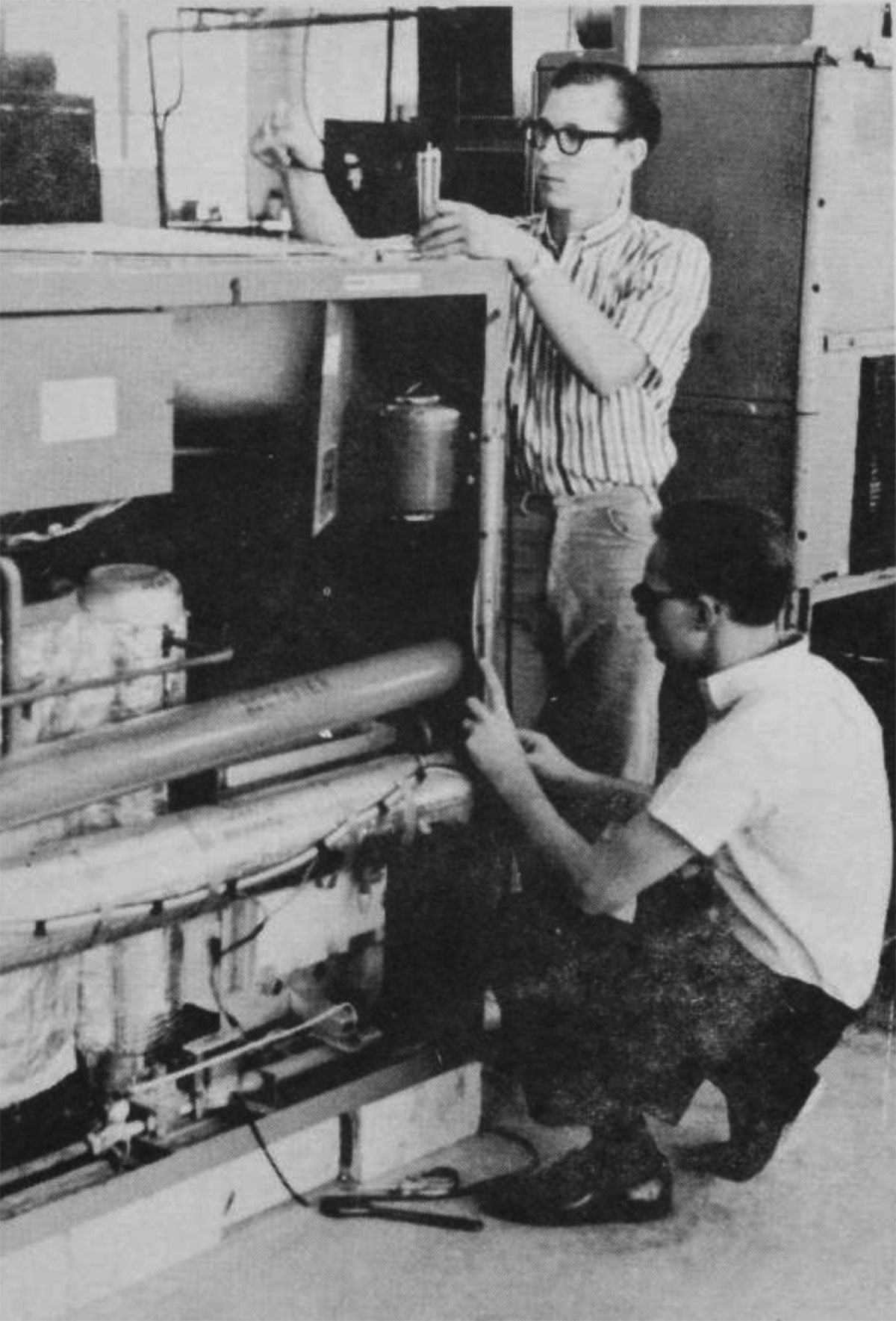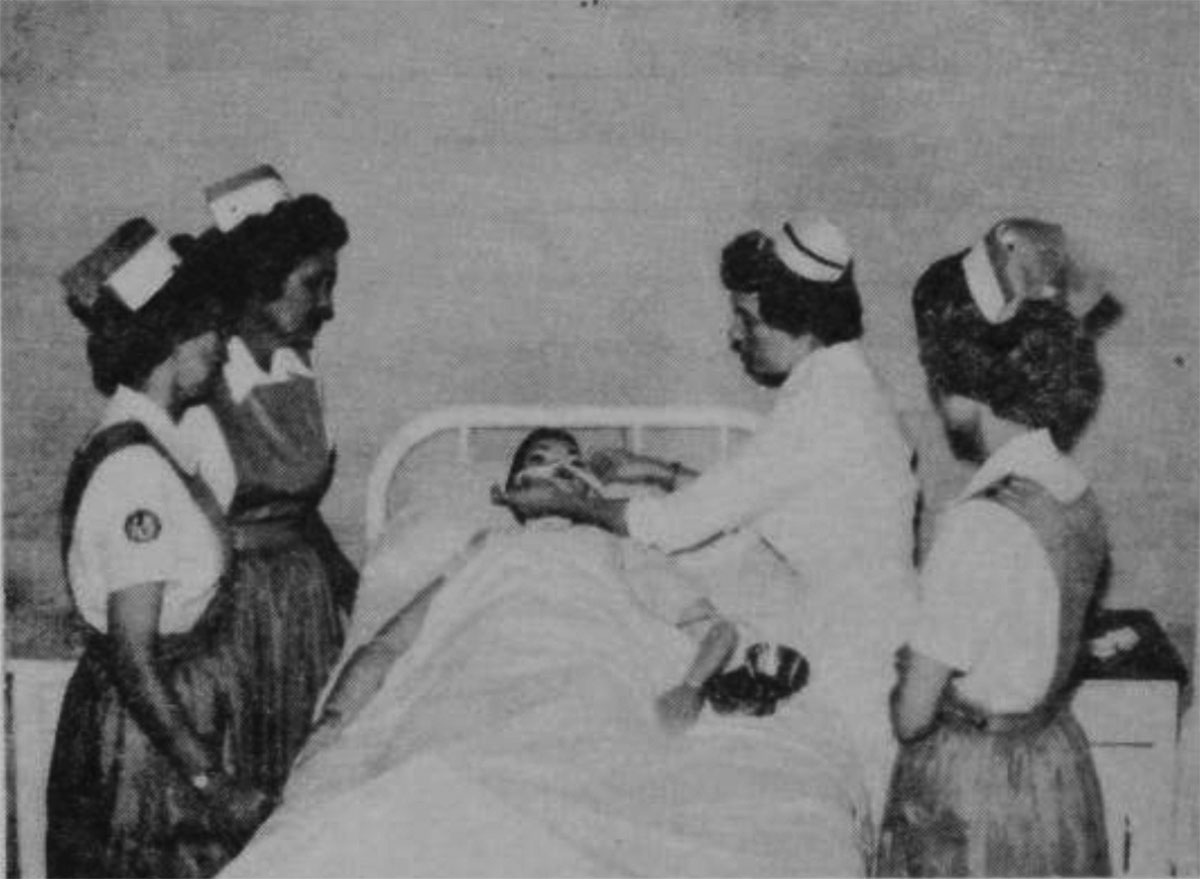
REFRIGERATION LAB—Steve Fox and Dixon Hebert, students in the school of vocations, work on a gas air conditioning unit during one of their lab sessions. The theory studied in classroom assignments is given practical application during the lab sessions. (Photo by Phillip Burr)
Vocations School Offers Skills From Electronics to Nursing
May 7, 1965
The day courses at the School of Vocations are comprised of six divisions: Machine Shop, Refrigeration and Air Conditioning, Welding, Diesel Technology, Electricity and Electronics, and Vocational Nurses Instruction.
In the machine shop various types of lathes, milling machines, drill presses, grinding machines, shapers, and planers are used in the study of the modern machine shop. The machine shops in industrial plants are depended upon to keep their equipment in operation. These machines repair worn-out parts or make new ones and they also make newly designed parts or machines that are brought into existence.
In this course, students are taught blueprint reading and sketching, the use of hand machine tools that are involved in the milling, shaping, and grinding of metals. Also a basic study of metallurgy is required. The objective in the labs is to develop the students’ skill.
In the refrigeration and air conditioning course the basic laws and fundamental principals of refrigeration, heat, heat transfer, thermonmetry, and the study of electrical devices used with refrigeration equipment are taught. Also a study of commercial and industrial refrigeration problems are part of the fundamental courses.
As the courses advance, more technically complete systems are studied; and in the labs, the students learn identification and correct use of tools and materials used in working with refrigerated equipment.
Disassembly, servicing, repairing, and installing of refrigeration and air conditioning equipment is emphasized in the lab work.
Layout work on plate and pipe along with the study of metallurgy of welding are stressed in the welding are stressed in welding courses. Another major part of this course is the setting-up and operation of acetylene and arc welding tools and equipment, and extensive practice in pipe welding.
In the Diesel Technology courses in the basic problems of operations, the design, and construction of diesel engines are studied.
Maintenance and repair problems, a comprehensive study if diesel fuels and lubrication oils, and the electrical and gasoline starting systems are stressed. The lab practice emphasizes the installation, operation, maintenance, and repair the diesel engines.
Correct usage of hand tools and precision instruments are developed in the lab courses as well as diagnosing of engine troubles, disassembly and assembly of diesel engines.
The basic courses in electricity and electronics offer the students fundamental theories of electricity, power, resistance, efficiency, illumination, and magnetism.
A through study of direct current motors, generators, and equipment including distribution systems is given in this course. The more advanced courses include alternating current and its application and use in A. C motors, alternators and control equipment.
The principals of vacuum tubes, rectifiers, amplifiers, transmitters, and receivers are covered. The Federal Communication Commissions’s Second and Third Class License requirements are included in the electricity and electronics course.
All types of modern residential and commercial wiring systems used in this course and shop methods of testing, repairing, and maintaining electrical appliance and equipment are practiced.

The role of Licensed Vocational Nurses has become much more demanding and complicated in recent years because of the shortage of Registered Nurses. This is the opinion of Mrs. Ann Keen, teacher of vocational nursing at the School of Vocations.
LVN’s are now hired and trained to work as medication nurses, scrub nurses in operating rooms, team leaders where team nursing is used, and in many small towns, because R.N.’s are not readily available, LVN’s have the capacity of head nurses. “This of course depends on the need,” said Mrs. keen.
There are 84 students enrolled in Lamar’s LVN training program this semester. Upon completion of the courses, which extend for 12 months, the students go to Austin to take the State Board Examination. The Last State Board Examination had almost 1000 students taking the tests. Miss Erni Ruth Simon’s, a Lamar student, grade was in the top 10 of all those taking the examination.
“Every year we usually have a student in the top 10,” said Mrs. Keen.
The teachers in the LVN training program are Mrs. Delores Jones, Mrs. Bernice Sturrock, and Mrs. Keen.
Compiled from the archives by Ja'Leigh Cerf.
